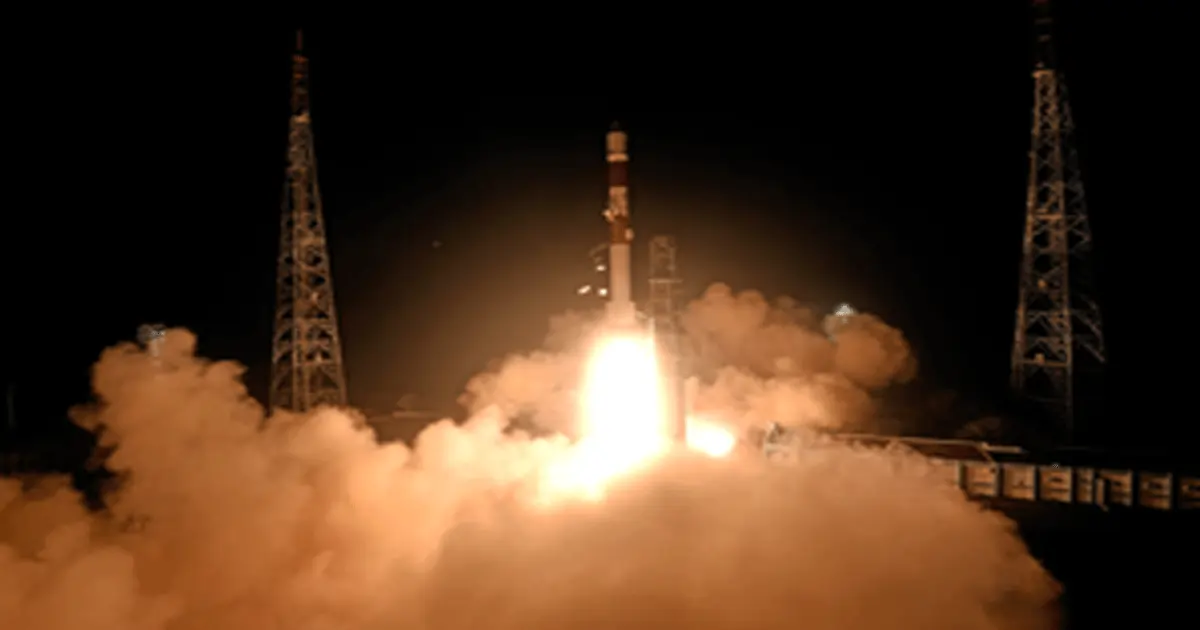Business
FM allocates Rs 13,415.20 cr for space sector, experts welcome Geospatial mission

New Delhi, Feb 1: Giving a much-needed boost to the space sector, Finance Minister Nirmala Sitharaman on Saturday announced an allocation of Rs 13,415.20 crore for the Department of Space in the Union Budget 2025-26.
In the latest budget, Rs 6,103 crore has been earmarked for capital outlay on space research. The move is expected to facilitate various ambitious projects, including satellite launches and deep-space missions.
The enhanced budget comes as India looks forward to upcoming major space launches including the Ganganyaan — India’s human spaceflight mission — as well as the Moon mission, setting up the Indian space station, and Chandrayaan-4.
The increased investment is expected to integrate space-based applications into critical sectors such as agriculture, disaster management, and urban planning.
This is a remarkable increase from previous budgets and reinforces the government’s commitment to growing India’s space ambitions. The Union Budget 2024-25 allocated Rs 13,042.75 crore for the space sector. A Rs 1,000 crore venture capital fund aimed at boosting private sector participation in India’s space industry was also launched last year.
This rise in funding in the space Budget follows India’s impressive achievements in space technology, such as the successful Chandrayaan-3 lunar mission and the Aditya-L1 solar observation project, underscoring the nation’s growing space capabilities.
“The increase in the space budget is a significant step towards strengthening India’s space ecosystem, fostering innovation, and enhancing global competitiveness,” Indian Space Association (ISpA) Director General, Lt. Gen. A.K. Bhatt (retd) said.
The government also removed customs duty on ground installations for satellites, including spares, consumables, and essential goods used in building launch vehicles and facilitating satellite launches.
“This long-awaited reform aligns with the industry’s needs, and we appreciate the government’s responsiveness to the sector’s requirements,” Bhatt said.
Meanwhile, the Finance Minister also announced the launch of a National Geospatial Mission in the Budget 2025-26.
The mission aims to modernise land records and enhance urban planning across India. This initiative will leverage the existing PM Gati Shakti framework to develop foundational geospatial infrastructure and data, facilitating improved design and execution of infrastructure projects, she said.
Geospatial refers to data or information that is associated with a specific location on the Earth’s surface. The National Geospatial Mission is expected to significantly impact various sectors, particularly in urban development and land management.
The experts noted that the announcement of the National Geospatial Mission shows the growing commitment of the government to use the downstream capabilities of the space tech sector.
“The users in the government, private sector, and the industry have lived with the lack of good foundational data for a very long time. The National Geospatial Mission will provide the necessary resources to create geospatial data that will serve as a foundation for social and economic development,” Esri India Managing Director Agendra Kumar said.
Business
Indian stock market opens lower, IT stocks lead losses

Mumbai, Dec 23: Indian benchmark indices opened in the red zone on Tuesday, weighed down by losses in the IT stocks after artificial intelligence (AI) stocks in the US showed revival.
As of 9.30 am, the Sensex declined 159 points, or 0.19 per cent to 85,407 and the Nifty lost 32 points, or 0.13 per cent to 26,139.
Main broad cap indices showed divergent trends, with the Nifty Midcap 100 down 0.18 per cent, while the Nifty Smallcap 100 added 0.07 per cent.
ONGC, Tata Steel and NTPC were among the major gainers in the Nifty Pack, while losers included Max Healthcare, TCS, Tech Mahindra, Asian Paints and ICICI Bank.
Sectoral indices on NSE were trading in the mixed zone, with IT leading losses down 1.21 per cent. Oil and gas as well as metal were the major gainers, up around 0.43 and 0.41 per cent, respectively.
Immediate resistance for Nifty is placed at 26,300–26,350, while key supports are located at 26,000–26,050 zone, said analysts.
Market watchers found two factors to affect the market in the near term, including positive macros or fundamentals and AI trade revival. Positive macro indicators may embolden bulls to push Nifty and Sensex to new highs. But the strong AI trade revival is a mild negative externally which may delay the anticipated FII outflow reversal, they said.
Defence stocks are seemingly recovering, with more room for growth in the segment, while the IT sector has also turned resilient, analysts said.
Asia-Pacific markets showed moderate gains on Tuesday, after AI trade lifted major Wall Street indexes overnight.
In Asian markets, China’s Shanghai index advanced 0.34 per cent, and Shenzhen edged up 0.65 per cent, Japan’s Nikkei added 0.02 per cent, while Hong Kong’s Hang Seng Index gained 0.33 per cent. South Korea’s Kospi added 0.45 per cent.
The US markets ended mostly in the green zone overnight, as Nasdaq advanced 0.52 per cent, the S&P 500 edged up 0.64 per cent, and the Dow moved up 0.47 per cent.
Investors are keen on rising geopolitical tensions between the US and Venezuela and delays in the Russia-Ukraine peace negotiations. The killing of a Russian army general in a bomb attack on Monday raised concerns over the peace process, lending support to crude oil prices.
On Monday, foreign institutional investors (FIIs) sold equities worth Rs 516 crore, while domestic institutional investors (DIIs) were net buyers of equities worth Rs 3,898 crore.
Business
India-New Zealand FTA: PM Modi, Luxon aim to double bilateral trade over 5 years

New Delhi, Dec 22: Prime Minister Narendra Modi held a telephone conversation with New Zealand’s Prime Minister, Christopher Luxon, on Monday as the two leaders jointly announced the successful conclusion of the historic, ambitious and mutually beneficial India-New Zealand Free Trade Agreement (FTA).
During the conversation, both leaders expressed confidence in doubling bilateral trade over the next five years as well as an investment of $20 billion in India from New Zealand over the next 15 years.
The negotiations began in March this year and the two leaders concluded the FTA in a record time of nine months, reflecting the shared ambition and political will to further deepen ties between the two countries, according to a statement from Prime Minister’s Office (PMO).
“The FTA would significantly deepen bilateral economic engagement, enhance market access, promote investment flows, strengthen strategic cooperation between the two countries, and also open up new opportunities for innovators, entrepreneurs, farmers, MSMEs, students and youth of both countries across various sectors,” said the statement.
The leaders also welcomed the progress achieved in other areas of bilateral cooperation such as sports, education, and people-to-people ties, and reaffirmed their commitment towards further strengthening of the India-New Zealand partnership.
This historic FTA eliminates and reduces tariffs on 95 per cent of New Zealand’s exports – among the highest of any Indian FTA – with almost 57 per cent being duty-free from day one, increasing to 82 per cent when fully implemented, with the remaining 13 per cent subject to sharp tariff cuts.
It puts New Zealand exporters on an equal or better footing to our competitors across a range of sectors and opens the door to India’s rapidly expanding middle class, according to an official statement from New Zealand.
“The Indian economy is forecast to grow to NZ$12 trillion by 2030. The India-NZ Free Trade Agreement unleashes huge potential for our world-class exporters to the world’s largest country and will significantly accelerate progress towards New Zealand’s ambitious goal of doubling the value of exports over 10 years,” it added.
Business
Mumbai-Bound Air India Flight Returns To Delhi Airport Minutes After Take Off Due To Technical Glitch

New Delhi: A Mumbai-bound Air India flight AI887 returned to the Delhi Airport minutes after take-off due to a technical issue. The Delhi–Mumbai flight made an emergency landing according to standard operating procedure.
As perv an Air India spokesperson, the aircraft (Boeing 777) landed safely at Delhi, and the passengers and crew disembarked.
The Boeing 777 suffered an engine issue soon after take-off, reported The Times of India. The aircraft reportedly took off at 6.10 am and returned to the airport at 6.52 am. The aircraft is currently undergoing necessary checks.
As per the report, the airline arranged another B777 (VT-ALP) for passengers and even provided refreshments for them.
On Sunday, over 100 flights were cancelled from the Delhi Airport due to dense fog conditions in the national capital. Meanwhile, more than 400 flights were also delayed at the airport.
Over the past few days, most parts of the nothern and northwestern regions of the country are witnessing dense fog condition.
“Dense to very dense fog conditions during night/morning hours very likely in some parts of Uttarakhand, Uttar Pradesh, Haryana till morning hours of 21st; in isolated pockets of Punjab, Haryana during 25th-27,” the India Meteorological Department (IMD) had said in its press statement on Sunday.
On Friday also, an Air India flight travelling from Mumbai to Varanasi was forced to make an emergency diversion to Bhubaneswar after deteriorating weather conditions made landing at the destination airport unsafe. The aircraft landed at Biju Patnaik International Airport (BPIA) as a precautionary measure, airline officials confirmed.
-

 Crime3 years ago
Crime3 years agoClass 10 student jumps to death in Jaipur
-

 Maharashtra1 year ago
Maharashtra1 year agoMumbai Local Train Update: Central Railway’s New Timetable Comes Into Effect; Check Full List Of Revised Timings & Stations
-

 Maharashtra1 year ago
Maharashtra1 year agoMumbai To Go Toll-Free Tonight! Maharashtra Govt Announces Complete Toll Waiver For Light Motor Vehicles At All 5 Entry Points Of City
-

 Maharashtra1 year ago
Maharashtra1 year agoFalse photo of Imtiaz Jaleel’s rally, exposing the fooling conspiracy
-

 National News1 year ago
National News1 year agoMinistry of Railways rolls out Special Drive 4.0 with focus on digitisation, cleanliness, inclusiveness and grievance redressal
-

 Maharashtra1 year ago
Maharashtra1 year agoMaharashtra Elections 2024: Mumbai Metro & BEST Services Extended Till Midnight On Voting Day
-

 National News1 year ago
National News1 year agoJ&K: 4 Jawans Killed, 28 Injured After Bus Carrying BSF Personnel For Poll Duty Falls Into Gorge In Budgam; Terrifying Visuals Surface
-

 Crime1 year ago
Crime1 year agoBaba Siddique Murder: Mumbai Police Unable To Get Lawrence Bishnoi Custody Due To Home Ministry Order, Says Report












